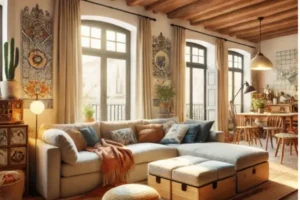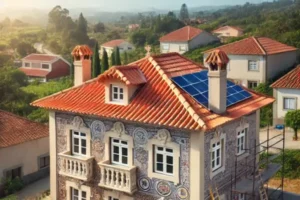Moving to Portugal is a dream for many expat families, drawn by its stunning landscapes, welcoming culture, and affordable lifestyle. Among the biggest attractions are the charming, older homes scattered across quaint villages and countryside—often available at prices that seem too good to pass up.
While these properties hold immense potential, they also come with hidden risks, especially when renovations are involved. From unexpected structural issues to navigating Portuguese regulations, the path to creating your ideal family home can quickly become overwhelming without careful planning.
For expat families looking to settle down affordably, understanding the challenges of renovating cheap homes is essential. By making informed decisions from the start, you can turn these opportunities into a safe and rewarding investment for your family’s future in Portugal.
The Allure of Cheap Homes in Portugal
Portugal has become a beacon for expat families seeking a better quality of life. With its mild climate, safe communities, and lower cost of living, the country offers a unique blend of charm and practicality. For those on a budget, the affordable property market—especially older, inexpensive homes—presents an irresistible opportunity to settle down in one of Europe’s most family-friendly destinations.
Why Portugal’s Affordable Homes Attract Expats
Many expats are drawn to the romantic idea of owning a home in Portugal without breaking the bank. These properties, often nestled in picturesque villages or on the edges of rolling vineyards, offer more than just affordability—they promise a lifestyle steeped in history and natural beauty.
- Picturesque Villages and Historic Charm
Tiny cobblestone streets, whitewashed houses with terracotta roofs, and views that seem straight out of a postcard—Portugal’s villages have a timeless appeal. Owning a home in these areas offers not just a place to live but an immersion in authentic Portuguese culture. - Proximity to Nature
From the rugged cliffs of the Algarve to the serene beauty of the Douro Valley, many affordable homes are just steps away from stunning landscapes. For families, this means the chance to live a life closer to nature, with outdoor activities like hiking, surfing, and exploring local wildlife right on their doorstep.
Common Motivations for Buying Inexpensive Homes
For many expat families, these affordable homes represent more than just a bargain—they’re a chance to create a dream lifestyle while maintaining financial stability.
- Budget Considerations for Families
Moving abroad with a family comes with significant costs, from education to healthcare. Choosing a cheaper home allows families to allocate resources to other priorities while still securing a foothold in Portugal’s idyllic property market. - The Dream of Creating a Personalized Home
Many older homes in Portugal require renovations, but this also means the opportunity to craft a space that’s uniquely yours. From designing a cozy family kitchen to restoring original features like stone walls or wooden beams, these projects allow expats to blend modern comforts with traditional Portuguese aesthetics.
Portugal’s affordable homes are more than just an entry point into the housing market—they’re the foundation for a new life filled with charm, adventure, and family memories. However, it’s crucial to approach these opportunities with both optimism and realism, as we’ll explore further in the next section.
Common Renovation Pitfalls
Renovating an affordable home in Portugal can be an exciting project, but it’s not without its challenges. Many expat families underestimate the complexity and hidden costs of transforming an older property, which can lead to unexpected stress and expenses. By being aware of the common pitfalls, you can navigate the process with greater confidence and avoid costly mistakes.
Hidden Structural Issues
Older homes often come with charm—but also a range of hidden problems that can turn your dream renovation into a nightmare.
- Outdated Construction Techniques and Materials
Many properties were built using traditional methods, such as stone foundations or clay roofing tiles, which may no longer meet modern safety standards. Issues like uneven walls, sagging roofs, or damp basements are common. - How to Spot Red Flags
Before committing to a purchase, hire a qualified structural engineer to conduct a thorough inspection. Look for signs of water damage, cracks in the foundation, or pest infestations, as these can be expensive to fix and impact the home’s long-term livability.
Bureaucratic Challenges
Portugal’s renovation regulations can be complex, especially for expats unfamiliar with the system. Understanding the legal requirements is crucial to avoid costly delays or fines.
- Permits and Zoning Regulations
Depending on the extent of your renovation, you may need local permits for structural changes or updates. Some properties, particularly those in historic areas, require additional approvals to preserve their architectural integrity. - Unclear Property Titles
Ensure the property’s legal documents are in order. Unresolved inheritance issues or discrepancies in zoning can cause significant delays, so work with a qualified lawyer to verify the paperwork.
Underestimating Renovation Costs
One of the biggest mistakes expats make is failing to budget accurately for renovations.
- Unexpected Expenses
What starts as a cosmetic upgrade—like repainting walls—can quickly uncover deeper issues, such as outdated plumbing, faulty electrical wiring, or a leaking roof. These repairs can inflate costs significantly. - Setting a Realistic Budget
Factor in at least 20-30% more than your initial estimate to account for surprises. Consult local contractors for quotes and consider using contingency funds to avoid financial strain mid-project.
Cultural and Language Barriers
Renovation projects often require collaboration with local professionals, which can be tricky for expats who don’t speak fluent Portuguese.
- Communication Challenges
Misunderstandings with contractors or suppliers can lead to delays or errors in the renovation process. It’s worth hiring a bilingual project manager or translator to ensure clear communication. - Navigating Local Bureaucracy
Dealing with municipal offices and legal requirements can be intimidating. Familiarize yourself with the basics of Portuguese bureaucracy and lean on trusted local advisors to smooth the process.
Being prepared for these pitfalls can save you time, money, and frustration, allowing you to focus on creating a safe and comfortable home for your family. In the next section, we’ll explore practical strategies for avoiding these common challenges and ensuring your renovation is a success.
Tips to Avoid Renovation Nightmares
Taking on a renovation project in Portugal can be incredibly rewarding, but preparation is essential to avoid turning your dream home into a source of stress. With the right strategies and support, you can navigate potential challenges confidently and transform an affordable property into the perfect home for your family.
Thorough Property Inspections
Before committing to any property, ensure you understand its true condition.
- The Role of Professionals
Hiring a licensed surveyor or structural engineer is non-negotiable. These experts can identify potential issues, such as foundation instability, roofing problems, or dampness, that may not be visible during a casual viewing. Their assessments can also help you negotiate a fair purchase price. - Key Red Flags
Watch out for cracks in walls, evidence of water damage, or poorly maintained electrical systems. Don’t overlook the exterior—landscaping issues like poor drainage or erosion can lead to significant costs later.
Understanding Local Laws and Regulations
Portuguese property laws and renovation rules can be complex, particularly for older or historically significant homes.
- Rules for Historic Buildings
If your property is in a protected area or has historic status, strict rules may govern what changes you can make. For instance, you might need to preserve original facades or use specific materials. - Consult a Local Property Lawyer
A property lawyer familiar with Portuguese laws can guide you through the legal requirements, ensuring your renovation complies with local codes and avoids unnecessary fines or delays. They can also verify property titles and zoning classifications to prevent surprises.
Building a Trustworthy Network
A successful renovation depends on having the right team in place.
- Reliable Professionals
Seek recommendations for reputable architects, contractors, and suppliers. Look for professionals with experience in working with expats, as they are often more familiar with cultural differences and communication needs. - Leverage Expat Communities
Many expats who’ve renovated homes in Portugal are happy to share advice and contacts. Join local forums or social media groups to tap into this wealth of firsthand experience.
Budgeting and Financial Planning
Careful financial planning is crucial to keeping your renovation project on track.
- Accurate Budgeting
Start with a detailed estimate that includes both essential repairs and aesthetic upgrades. Always add a 20-30% contingency fund to cover unforeseen expenses, such as outdated wiring or structural reinforcements. - Explore Financing Options
Research renovation loans or government grants that may be available to restore older properties. Some municipalities in Portugal offer incentives for preserving historic homes or promoting sustainable building practices.
By taking these proactive steps, you’ll not only reduce the risks of costly mistakes but also set the stage for a smooth renovation process. With the right preparation and support, your affordable home can become a safe, comfortable space for your family to thrive in Portugal.
Dealing with No-Shows and Unreliable Service Providers
One of the challenges expats often face during renovations in Portugal is dealing with service providers who fail to show up as scheduled. While this can be frustrating, it’s a common occurrence that can be managed with the right approach.
- Set Clear Expectations
From the start, ensure that your agreements with contractors or service providers are clear and documented. Include specific deadlines and expectations in writing, which can help minimize misunderstandings and hold everyone accountable. - Build in Buffer Time
Scheduling flexibility is crucial. Delays are common, so plan for some extra time in your renovation timeline to avoid stress if someone doesn’t show up as promised. - Vet Providers Thoroughly
Seek recommendations from trusted sources, like other expats or local contacts. Check online reviews or ask for references to ensure you’re working with reliable professionals. - Follow Up and Stay Firm
Confirm appointments the day before and follow up promptly if someone doesn’t appear. While maintaining a polite tone, be firm about your expectations for professionalism and timelines.
Dealing with these hiccups requires patience, but with good communication and careful vetting, you can avoid major disruptions and keep your renovation on track.
Why Planning Ahead is Key
Buying and renovating a home in Portugal is an exciting journey, but it’s also one that requires careful planning. For expat families, the balance between chasing the dream of an idyllic home and addressing practical realities can make all the difference in ensuring a smooth transition.
Balancing Dreams with Practicality
It’s easy to fall in love with the charm of an old stone cottage or a sprawling countryside villa, but it’s essential to weigh the long-term feasibility of your vision. Renovations often take more time, money, and effort than anticipated. By tempering your excitement with a realistic assessment of the work involved, you can avoid burnout and ensure your project aligns with your family’s lifestyle and budget.
The Benefits of Research, Budgeting, and Networking
Rushing into a purchase or renovation without adequate preparation can lead to unnecessary stress and expenses. Taking the time to gather information upfront pays dividends later.
- Research: Study the local property market, learn about regional regulations, and understand the renovation requirements specific to Portuguese homes. This knowledge empowers you to make informed decisions and avoid unpleasant surprises.
- Budgeting: A detailed financial plan ensures you won’t overextend yourself. Knowing your limits helps you prioritize renovations that matter most for your family’s needs, whether it’s upgrading insulation for comfort or modernizing the kitchen for convenience.
- Networking: Building connections with local professionals, expat communities, and even neighbors can provide invaluable guidance. Recommendations for trustworthy contractors or advice on navigating bureaucracy can save you time and headaches.
How Avoiding Pitfalls Leads to a Smooth Relocation
By planning ahead, you minimize the risks and maximize the rewards of your move to Portugal. A well-researched, carefully budgeted renovation process means fewer delays, fewer financial surprises, and more time to enjoy your new life.
For families, this preparation also ensures a stable and comfortable environment—whether that means a fully functioning home before the school year starts or a stress-free place to settle as you adapt to a new culture. Planning not only secures your investment but also gives you peace of mind to focus on creating lasting memories in your new home.
With the right approach, your relocation can be a rewarding adventure, setting the foundation for a bright and fulfilling future in Portugal.
Turning Dreams Into Reality With the Right Plan
Affordable homes in Portugal hold incredible potential for expat families, offering a chance to create a personalized space in one of the most beautiful and welcoming countries in Europe. However, the journey from a bargain property to a dream home comes with challenges. By understanding the risks, planning carefully, and building a reliable network, you can avoid common pitfalls and make the experience both rewarding and stress-free. With the right preparation, you’ll be well on your way to building a happy, fulfilling life in your new Portuguese home.
We’d love to hear about your own renovation experiences or any challenges you’re facing as you plan your move to Portugal. Share your story in the comments!




